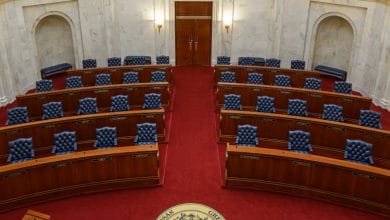Would Mean Millions in Unlawful Tax Collections
By David Ferguson
Pulaski County Circuit Court Judge Herbert Wright declared the LEARNS Act has not yet become effective because of how the Act’s emergency clause was passed. If the Arkansas Supreme Court allows the decision to stand, one of the many consequences of the decision will be that millions of dollars in Arkansas tax collections will be in jeopardy.
I give you just one example. The internet sales tax began being imposed almost a month before laws without an emergency clause would have become effective. Following the Circuit Court decision in the LEARNS Act case, would mean the millions of dollars in taxes imposed during that period would be illegal.
Judge Wright decided the emergency clause of the LEARNS Act was not properly adopted and therefore the law could not become immediately effective. Instead, Judge Wright said the law will have to wait until the normal date for laws without emergency clauses to become effective, which under my calculations is July 29. 2023.
The Arkansas General Assembly voted on the LEARNS Act and all other acts having an emergency clause by declaring the vote would be on both passage of the bill and passage of the emergency clause. Then the vote was recorded on the journals as a separate vote for each. The circuit court decision says the vote on passage must be taken first and then, and only then, can the vote on the emergency clause be taken.
As I have noted before, a decision against the LEARNS Act emergency clause puts in jeopardy the entire state general revenue budget for a month because appropriation laws must rely on an emergency clause to become effective on the beginning of the fiscal year, which is July 1.
Unless the Arkansas Supreme Court reverses the decision, every law passed with an emergency clause must now be examined to determine whether the early effective date negatively affected anyone’s rights. I am not just talking about laws passed this year.
As an example, consider Act 822 of 2019 (SB576) which was a tax bill that used an emergency clause to implement the internet sales tax. The Act was signed by then Governor Asa Hutchinson on April 9, 2019. The emergency clause declared the internet sales tax to be effective on a specific date, July 1, 2019. Under Opinion No. 2019-034, Attorney General Leslie Rutledge determined the effective date of legislation without an emergency clause passed in the 2019 regular session of the legislature became effective July 24, 2019.
If the circuit court decision is upheld, then collections of the internet sales tax based on sales from July 1, 2019 through July 23, 2019 are illegal.
Just this one act could cost the state millions of dollars in illegally collected taxes, but I can already remember other tax increases imposed under an emergency clause. The internet sales tax could be just a drop in the bucket once other taxes are reviewed. That review might go back over the past forty years or more.
Why do I say forty years? Litigants may be able to prove how emergency clauses were passed that far back or farther. The House of Representatives has an internet archive of years of video of its proceedings on its website. Before that, the House allowed its proceedings to be recorded and shown on some local cable channels. Recordings back to the 1970’s or 1980’s might still be available.
If the circuit court decision stands, the feeding frenzy of lawsuits will begin. First, there will be illegal exaction suits on multiple taxes that were collected early because of an emergency clause. Second, criminal defense lawyers will review criminal laws to determine whether a client was sentenced for an act committed between the date of an emergency clause and the date laws without an emergency clause became effective. Third, any other significant law with an emergency clause could be examined to see how a client’s rights were impacted by an early effective date.
It is as if Judge Wright had said “Release the Kraken!” and now the chaos begins. Will the Arkansas Supreme Court allow such a result to stand?
David Ferguson is a former Director of Arkansas’ Bureau of Legislative Research, having a thirty-two-year career as an attorney for the Arkansas legislature. After retirement from state service, his primary focus has been beef cattle farming. He is also a former officer of Conduit for Action.






